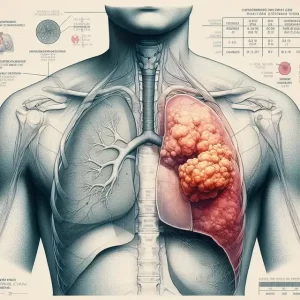2023 Q3: Inventory of Innovative Drugs Approved by NMPA and FDA
- Brief Intermittent Exercise Reduces Heart Disease and Death Risk
- Personalized Lung Tumor Chips Assess PD-1 Therapy Response
- Study Shows Prior Infection Offers Strong Immunity to Original COVID-19 Strain
- Chinese Food Products Dominate Korean Tables Amid Safety Concerns
- Early Detection of Hypopharyngeal Cancer Possible with Saliva Diagnosis
- EB Virus Could Be Infected by Kiss: A Hidden Threat Linked to Cancer
2023 Q3: Inventory of Innovative Drugs Approved by NMPA and FDA
- AstraZeneca Admits for the First Time that its COVID Vaccine Has Blood Clot Side Effects
- Was COVID virus leaked from the Chinese WIV lab?
- HIV Cure Research: New Study Links Viral DNA Levels to Spontaneous Control
- FDA has mandated a top-level black box warning for all marketed CAR-T therapies
- Can people with high blood pressure eat peanuts?
- What is the difference between dopamine and dobutamine?
- How long can the patient live after heart stent surgery?
2023 Q3: Inventory of Innovative Drugs Approved by NMPA and FDA.
According to statistics, in the third quarter of 2023 (up to September 26th), NMPA approved 4 new drugs, while FDA approved 11 new drugs.

NMPA Approves 4 Innovative Drugs
According to data from Pharm Intelligence, in the third quarter of 2023 (up to September 26th), NMPA approved 4 new drugs, including 2 biologics, 1 small molecule drug, and 1 traditional Chinese medicine compound (a Category 3.1 new drug in Chinese regulations). In terms of indications, two of them are for cancer treatment, and one is a lipid-lowering drug.
Narusobai Monoclonal Antibody
On September 6th, NMPA conditionally approved the marketing of Narusobai Monoclonal Antibody, developed by Shanghai Jinmant Bio-Technology Co., Ltd., a subsidiary of Chi-Med Group. It is used to treat adult patients with unresectable or potentially debilitating giant cell tumors of bone.
This drug is a recombinant fully human anti-receptor activator of nuclear factor-κB ligand (RANKL) monoclonal antibody. It inhibits RANKL activity by specifically binding to it on the cell surface, thereby suppressing bone resorption and tumor growth mediated by RANKL.
Clinical trial data showed that Narusobai Monoclonal Antibody has a high tumor response rate of up to 93.5% in the treatment of unresectable or surgically challenging giant cell tumors.
Shuwoteni
On August 23rd, NMPA conditionally approved Shuwoteni tablets (trade name: Shuwoteni) submitted by DiZhe (Jiangsu) Pharmaceutical Co., Ltd., a Category 1 innovative drug.
This drug is indicated for adult patients with locally advanced or metastatic non-small cell lung cancer (NSCLC) with EGFR exon 20 insertion mutations who have progressed on or after platinum-based chemotherapy or who are intolerant to platinum-based chemotherapy.
Currently, there are only two EGFR/Exon20ins EGFR drugs available globally: Amivantamab by Johnson & Johnson and Mobocertinib by Takeda Pharmaceuticals. Shuwoteni has demonstrated superior efficacy and safety compared to these major competitors, particularly in patients with baseline brain metastases.
Tolaisiximab
On August 17th, NMPA approved the marketing of Tolaisiximab injection (trade name: Xinbile) submitted by Sundia Biopharmaceuticals (Suzhou) Co., Ltd. Tolaisiximab injection is a proprotein convertase subtilisin/kexin type 9 (PCSK9) inhibitor used for lipid reduction.
Tolaisiximab injection is the first domestically developed PCSK9 inhibitor to receive regulatory approval in China and represents Sundia Biopharmaceuticals’ first product in the cardiovascular disease field.
Traditional Chinese Medicine Compound Pi Pa Qing Fei Granules
On July 27th, Jilin Aodong Taonan Pharmaceutical Co., Ltd. obtained regulatory approval for Pi Pa Qing Fei Granules, a traditional Chinese medicine compound listed under the Catalog of Ancient Classic Formulas (i.e., a Category 3.1 new drug).
Pi Pa Qing Fei Granules are used to clear lung heat and are indicated for symptoms of lung heat, including nasal congestion, redness, swelling, pain, and the discharge of pink or crusted secretions.
FDA Approves 11 Innovative Drugs
During the same period, the FDA approved 11 new drugs, showing a slight decrease compared to the first and second quarters when 13 drugs were approved in each.
Table 1: FDA-Approved Drugs in the Third Quarter of 2023 (Black represents small molecule drugs, blue represents biologics)

In terms of drug types, there were 6 biologics (4 antibodies and 2 peptides) and 5 small molecule drugs. Small molecules accounted for 45% of the approvals, indicating their continued importance among global innovative drugs. This contrasts with the domestic focus on biologics in China’s innovative drug landscape.
In terms of indications, the drugs approved by the FDA in this quarter covered a wide range, including oncology, myelofibrosis, inflammation, viral infections, and featured several first-in-class therapies. Notably, 5 of the FDA-approved drugs in this quarter were for hematological and bone-related tumors, including Ojjaara, Aphexda, Elrexfio, Talvey, and Vanflyta, which is a significant characteristic of this quarter’s approvals.
Regarding rare diseases, the FDA approved 2 drugs in the third quarter, namely Veopoz for CHAPLE syndrome and Sohonos for fibrodysplasia ossificans progressiva (FOP). Both drugs represent first-in-class treatments for their respective conditions and demonstrate great potential for both small molecules and biologics in the rare disease field.
The small molecule drugs approved by the FDA.
Ojjaara (Momelotinib)
On September 15th, the FDA approved Ojjaara (Momelotinib) developed by GlaxoSmithKline for the treatment of adult patients with intermediate or high-risk myelofibrosis associated with anemia, including primary myelofibrosis or myelofibrosis following polycythemia vera or essential thrombocythemia.
Ojjaara is an oral once-daily JAK1/JAK2 and activin receptor type 1 (ACVR1) inhibitor.
It is the only drug approved so far for the treatment of anemia, symptoms, and splenomegaly (enlarged spleen), the main manifestations of myelofibrosis, in newly diagnosed and previously treated patients.
Sohonos™ (Palovarotene)
On August 16th, the FDA approved Palovarotene capsules, developed by Ipsen Pharmaceuticals, as a retinoic acid class drug, for the reduction of heterotopic ossification volume in adult and pediatric patients (8 years and older for females, 10 years and older for males) with progressive fibrodysplasia ossificans progressiva (FOP), also known as “stone man syndrome.”
Palovarotene is an oral selective retinoic acid receptor γ (RARγ) agonist that modulates the interactions between receptors, growth factors, and proteins in the retinoid signaling pathway to reduce the formation of new abnormal bone.
Currently, Palovarotene is approved in the United States and Canada and has received conditional approval in the United Arab Emirates, but its application for approval in the European Union has been rejected.
Zurzuvae (Zuranolone)
On August 4th, the FDA approved Zurzuvae (Zuranolone) developed by Bojiang & Sage for the treatment of postpartum depression (PPD) in adults. Zurzuvae is the first and only oral medication that rapidly alleviates symptoms of depression in women with PPD.
This drug is a synthetic, orally active, inhibitory neurosteroid and a positive allosteric modulator of GABAA (γ-aminobutyric acid A) receptors, with high oral bioavailability and a suitable half-life for once-daily dosing.
Xdemvy (Lotilaner)
On July 25th, the FDA approved Xdemvy (Lotilaner ophthalmic solution) 0.25% for the treatment of blepharitis. Xdemvy, previously known as TP-03, is the first and only treatment specifically targeting Demodex, the root cause of blepharitis.
The drug primarily eradicates Demodex mites at the molecular level by selectively inhibiting the GABA chloride ion channels of the mites. Phase III registration clinical trials for Xdemvy have already been initiated in China.
Vanflyta (Quizartinib)
On July 20th, the FDA approved Vanflyta (Quizartinib) developed by Daiichi Sankyo for the treatment of newly diagnosed FLT3-ITD-positive acute myeloid leukemia (AML), both in combination with standard cytarabine and anthracycline induction chemotherapy, and as a single-agent maintenance therapy.
Vanflyta is an oral potent type II FLT3 inhibitor that selectively targets FLT3-ITD mutations. It was initially approved in 2019 as a monotherapy for adult patients with relapsed/refractory FLT3-ITD-positive AML.
Conclusion
Looking at the new drugs approved in the third quarter, it’s evident that there’s a shortage of innovation in small molecule chemical drugs, which often have outdated structures and targets.
In contrast, the FDA’s approvals in this quarter still include a significant number of small molecule drugs with a wide range of indications. This reflects the pharmaceutical industry’s investment in research and development, access to research resources, rich R&D teams and equipment, and the maturity of innovative technologies. These factors contribute to the continued prominence of small molecules in the global landscape of innovative drugs, in contrast to China’s emphasis on biologics in the field of innovation.
2023 Q3: Inventory of Innovative Drugs Approved by NMPA and FDA
(source:internet, reference only)
Disclaimer of medicaltrend.org
Important Note: The information provided is for informational purposes only and should not be considered as medical advice.



